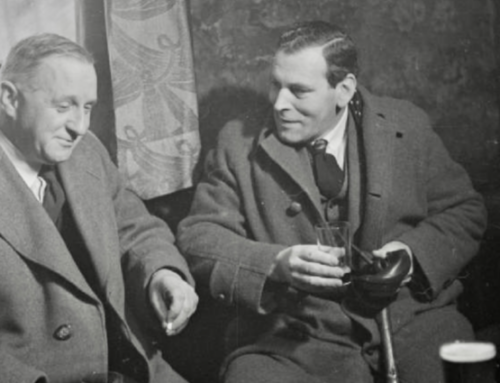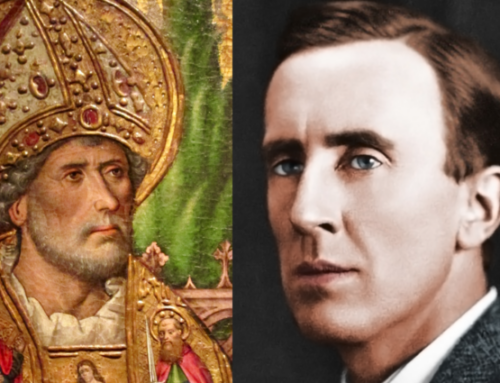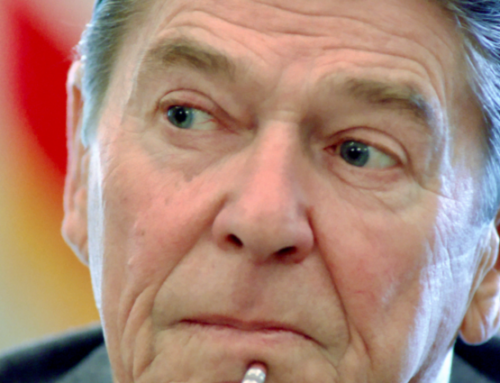.jpg)
As I’ve frequently made clear in print and in lectures, I hold Larry Reed in the highest regard. I first had the opportunity to work with Larry in the fall of 1988 or 1989 (I can’t remember now!), and we hit it off instantly. Sitting our first evening together in a Vietnamese restaurant, Larry held me spellbound with his many stories of going behind the Iron Curtain (in Europe, in Asia, in the Near East, and in Africa).
Through it all, I realized what a humble man this great man is. I’ve not thought differently in the over two decades I’ve known him.
Now president of the Foundation for Economic Education, Larry has made the venerable organization a force to be reckoned with. Larry, unlike so many in this world, lives as he believes. He’s been a profound witness and friend, and I’m honored he took the time to talk with us at The Imaginative Conservative.
As you can see in the interview, Larry speaks candidly about his life and his ideas, and he offers some intriguing ideas on many things we hold dear and true at The Imaginative Conservative. Larry’s answers made me smile, laugh, and think. I especially appreciated his comments on the Pol Pot and “The Sound of Music.”
*****
Brad Birzer: Larry, thanks so much for talking with us. What an honor. Please tell us a bit about yourself.
Larry Reed: My pleasure, Brad. Thanks for the opportunity!
I was born and raised near Beaver Falls, in the hills of Southwestern Pennsylvania. My dad’s side of the family was Scottish and my mother’s was German so our family was always cheap and efficient. My father owned a hardware and plumbing supply store. He taught me an appreciation for the business side of life—being entrepreneurial, working hard, keeping customers happy, taking risks, planning for the future. He didn’t care for government rules and paperwork and imparted a healthy skepticism of political authority. He didn’t read much about economics or social/political issues but he had all the right instincts, character and common sense. Often on Saturdays, I helped him smuggle milk from nearby Negley, Ohio, back into Pennsylvania, which had stupid, indefensible laws back then to benefit the Pennsylvania dairy industry.
Fresh out of graduate school (my “earned” degrees are from Grove City College and Slippery Rock University, my “honorary” doctorates are from Central Michigan University and Northwood University), I started teaching Economics in Michigan. After seven years of that, I entered the think tank world, first in Idaho and then for 20 years back in Michigan, running the Mackinac Center for Public Policy. After those two decades, I had planned to focus on speaking and writing but the opportunity arose to help put FEE on the right track so I took it.
My involvement with the Foundation goes back to 1968, when I first began reading its publications as a 15-year-old. I began writing for its journal, “The Freeman,” in 1977, speaking at its seminars in 1978 and then serving as a board member for eight years in the 1990s, chairing it for three. I’m happy to report that since I became president of FEE in 2008, we’ve refreshed the staff, opened a branch office in Atlanta, developed a comprehensive strategic plan, made the tough decision to move the headquarters to Georgia later this year, and turned the organization around financially. Today we touch more people with liberty ideas—via programs, publications, lectures and the Web—than we have in many years.
It’s hard to talk about my last 35 years without mentioning overseas travel. I’ve been fortunate to have visited 81 countries since 1985, some of them many times. In speeches, I frequently relate what I learned from those travels—especially stories of heroism on the part of real people with whom I met or interviewed.
Finally, I am a Christian, a libertarian, a lover of animals, and a cheerleader for the great work that kindred spirits all over the world are doing on behalf of liberty. Few things please me more than providing some encouragement to men and women who are on liberty’s front lines. I also go fishing every chance I get. And I like a good cigar and skydiving, but not both at the same time. There you have me in a nutshell, which my big government friends say is where I belong.
LR: Aside from my father whose influence I’ve just noted, my thinking was greatly shaped by my undergraduate economics mentor, Dr. Hans Sennholz of Grove City College. He was an inspiration to commit my career to advancing liberty. FEE’s founder, Leonard Read, taught me the importance of being an empathetic and appealing communicator if you want to make converts. My late colleague at the Mackinac Center and long-time best friend Joe Overton showed me how indispensable personal character is to both the good life and to effective outreach.
Among the authors whose writings influenced me highly are such diverse figures as Ludwig von Mises, Russell Kirk, Henry Hazlitt, Dale Carnegie, R. C. Sproul and Ayn Rand. Dozens of brave people behind the Iron Curtain affected me deeply in the 1980s. I love to read biographies of great men and women in the hope that something of their virtues, perseverance or example will rub off on me—people like William Wilberforce, Thomas Clarkson, William Lloyd Garrison and Harriet Tubman of the anti-slavery movement; Solzhenitsyn, Sakharov and Scharansky, who bravely resisted Soviet tyranny; and other heroes like Dietrich Bonhoeffer, David Livingstone, William Ewart Gladstone, Grover Cleveland, Margaret Thatcher, Lysander Spooner, Frederic Bastiat and Murray Rothbard. That may strike some as an odd combination but a person doesn’t have to be perfect or even consistent for me to appreciate the good in them. Nor do I have to agree with them on everything to admire their achievements and contributions.
At the core of my thinking is an abhorrence of force. I’m not a pacifist. I come down hard in favor of retaliatory force to stop or punish the initiation of force in such forms as fraud or violence. I’m a mind-your-own-business, live-and-let-live person. I’m tolerant of the way other people want to live their lives, even if they live them in distasteful ways, so long as they live up to their responsibilities and leave others alone. I’m a “voluntaryist,” to use a term coined by one of my favorite philosophers and political thinkers, Auberon Herbert. Like the virtues of honesty, patience, courage and self-discipline, an aversion to the initiation of force should be more than simply a policy. It should be an ethic, a state of mind, our default position.
Those who advance through voluntary means—who rely on persuasion, work, thrift, entrepreneurship, responsibility, wealth creation, trade and contract—are the champions of civilization. Those who redistribute, think with clubs instead of their brains, belittle achievement, take instead of make—they are the barbarians who threaten civilization itself. Each of us has to decide how we want to “mathematically” impact the world—do we want to add and multiply, or divide and subtract? Each of us is in charge of his personal character, which in turn will determine what kind of person he becomes and the difference he makes.
BB: During the 1980s, you ran books—rather than guns—into the Eastern Bloc. You’ve been described as the “Indiana Jones of Michigan.” Tell us about your experiences. Why the non-violent route against the Communists?
LR: Well, it wasn’t because I thought violence against brutal regimes wasn’t justified. If a poor Cambodian had a good shot at knocking off Pol Pot, who could do anything but cheer him on? But violence just wasn’t—and isn’t—in the cards for me personally. Ideas in long run are, as Victor Hugo said, “more powerful than all the armies of the world.” When it came to Soviet tyranny, I decided I was a better sniper if I shot books and pamphlets than if I shot bullets. Strategy and tactics are critical in the battle for liberty. You don’t want to do something stupid that simply removes you from the battlefield. I can’t imagine what I could ever have done in a violent way that would have made any sense, but I wouldn’t judge harshly those on the front lines who chose otherwise. The men and women who felt they had to fight Soviet tyranny with guns are heroes.
Ever since I saw “The Sound of Music” as a 13-year-old, I’ve had a fascination with people who resist oppression. I love talking to them, interviewing them, learning from their experiences. I want to know what makes them tick. I’m intrigued by the events and ideas that give them courage, that push them from indifference to concern to action. How do they come to lose their fear and then take risks to stand up for what they believe? I’ve learned a great deal from spending time with them in such places as Mozambique, Cambodia, Poland, East Germany, China and Nicaragua. I have so many stories from so many places that I hardly know where to begin. Suffice it to say that my experiences have taught me or reinforced in me these critical principles: 1) Freedom makes life worth living and its absence is unthinkable; 2) Evil is prevalent in the world but there are heroes in our midst who give me hope and optimism; 3) Never underestimate the resourcefulness of free minds and free markets to undermine even the ugliest forms of repression; 4) A single person with the right ideas and courage can change the course of history; 5) If you don’t stand for something, you’ll likely fall for anything.
BB: We’ve both seen a lot in our respective lifetimes, Larry. What do you consider to be the most important problems in the U.S today? Of the West?
LR: I think all of the big, attention-getting problems we all talk about (debt, deficits, crime, war, drugs, etc.) are symptoms of a bigger problem, the erosion of character. When people let their character slip, bad things begin to happen: They focus on the here-and-now and ignore the future. They let themselves be suckered into false promises of security at the expense of their liberties. They demand things that don’t belong to them. They mortgage the future of their own grandchildren. They blame others for their own poor judgments and irresponsibility. They empower bureaucracies, inflate their money, steal from their neighbors and vote to rob Peter and give the loot to Paul. Fix the character problem and just about all the others will be taken care of or be greatly diminished.
BB. Huge problems, to be sure. What would you do to solve these?
LR: As a Christian, I think devotion to the teachings of Christ and accepting Christ as your savior—very personal matters—represent the best answer. I recognize that many people may not bring themselves to that point. But that doesn’t mean they can’t be lovers of liberty and allies in the effort to restore and preserve it. You may be of a different faith or no faith but you should still see the indispensability of living up to the standards a free society requires. So that brings us to education. Liberty demands that we educate for it. There is no quick fix or silver bullet to fix the problems I think you’re referring to. Bad ideas that led to them must be replaced in our minds with good ones. Educating for liberty begins in one’s heart. You then learn it, live it, teach it and support it. You raise your children in it. You put your time, energy and resources into it. You can’t be a bystander or a freeloader. I’ve created a “Daily Liberty Checklist” I recommend to your readers.
BB: Thanks, Larry. I didn’t know about this site, and I do a pretty good job of keeping up with your incredible output. I look forward to exploring it.
You are now the president of one of the most important—if not THE most important–voluntary associations in the world. What is the role of community and association? What can FEE do for the world and for freedom?
LR: What you call “community and association” I call “civil society,” so long as it springs from personal choice and private cooperation. It takes many forms but it all stems from individuals choosing to interact with others in peaceful, mutually-beneficial ways. We do it through our families, churches, businesses and charities. It means helping one another directly and without the expensive, intrusive and usually ineffective political process. A measure of just how civilized we are is the extent to which we rely on such voluntary, non-political means to get what we want. A free society will have vibrant, private institutions that deal with poverty, promote the arts, educate our children and otherwise define our culture. So community and association are extremely important.
We’ve determined that FEE can do more to make the world a freer place if we spend less on buildings and property and more on programs and publications, which is a big reason we made the tough but necessary decision to eventually relocate from our ancestral headquarters in New York to a new site in Atlanta, Georgia. We also have decided to focus what we do on the 16-to-24 year-old age group because the future of liberty depends on inspiring young people today. In coming months and years we will be more fully utilizing technology and social media to inspire, educate and connect relative newcomers to liberty ideas so they will become effective activists for liberty tomorrow. Our principles have never changed and never will so long as I am president, but we can do so much more to reach more people with our message. This we will do, confident that liberty is right and good and the ultimate winner if we work for it.
BB: My guess is that you generally describe yourself as a libertarian (as you did earlier in the interview) or a classical liberal? What can classical liberals do in alliance with “imaginative conservatives,” as we like to call ourselves? Or, is such an alliance a real possibility?
LR: I use both terms, “libertarian” and “classical liberal,” when a label is required, though I always caution people not to let the label do their thinking for them.
As I’ve strongly suggested earlier in this interview, I think the great unifier between libertarians or classical liberals on the one hand and “imaginative conservatives” on the other is the non-initiation of force. Whenever and wherever both groups support solving a problem through voluntary, civil-society means, we’ve got a basis for alliance. The fact that there may be some differences on other issues shouldn’t prevent such cooperation. Ask yourself, “If I had my way, would there be more or less force in society?” If the answer is less, then let’s talk. We have many common enemies who would only prosper if we don’t.
BB: Well, Larry, after all that, I just want to say “amen.” Thanks so much for your time, your excellent thoughts, and your good will.
The Imaginative Conservative applies the principle of appreciation to the discussion of culture and politics—we approach dialogue with magnanimity rather than with mere civility. Will you help us remain a refreshing oasis in the increasingly contentious arena of modern discourse? Please consider donating now.









Thank you, Dr. Birzer, for this excellent interview.
Larry Reed is a man of great character and integrity who unceasingly searches for Truth.
Private, voluntary community and association cannot work without personal integrity and responsibility. Not only is Larry Reed fighting for freedom around the world, but he is also fighting for the people in this world to have an upright moral character.
He is a great man and we all have much to learn from him.
I agree with Chuck. Larry is a great person to know both personally and professionally. He is an inspiration to the liberty movement and someone that we can all learn from.
Great interview. What Larry said about the "erosion of character" is tragically true.
He's the best! I'm happy to say that we have Larry tomorrow night at the regular meeting of the Republican Club in Palm Beach County and all are welcome to just show up at the Atlantis Country Club at 6PM. for details contact gblumel@bellsouth.net
He'll be speaking on "The Difference One Can Make: Unsung Heroes of History" –are stories of incredibly inspiring but lesser known individuals whose courage and character teach volumes to all.
Mr. Reed states: "You may be of a different faith or no faith but you should still see the indispensability of living up to the standards a free society requires. So that brings us to education. Liberty demands that we educate for it. There is no quick fix or silver bullet to fix the problems I think you’re referring to. Bad ideas that led to them must be replaced in our minds with good ones. Educating for liberty begins in one’s heart." I would reply that love begins in one's heart. Not liberty.
Life is not lived for liberty alone. Education's mission is not "educating for liberty." The True, the Good and the Beautiful are of much higher priority. Let us educate for virtue, honor, duty, truth and wisdom.
And let's not pretend that labels don't matter. If they correspond to a world view then they are symbols of meaning which help us comprehend complex systems of thought.
"I think the great unifier between libertarians or classical liberals on the one hand and 'imaginative conservatives' on the other is the non-initiation of force." This is a very traditional libertarian definition of freedom. It is not a conservative one and certainly not a Christian definition. Porn, prostitution, heroin use, homosexual marriage, I could go on and on. All of these are part of "freedom" in a libertarian world. For a libertarian societal standards are not important only the non-initiation of force.
I believe that the reason our culture is sinking into decay is not simply a lack of freedom. That seems very plain. Too much government is A problem, it is not THE problem. Thus liberty is important, but not our first priority.
Decay of virtue, decay of honor, decay of responsibility is not caused by government in this Republic. We must seek truth, wisdom and virtue. How very sad it is when we limit ourselves to focusing on government as the problem and the solution is simply more liberty. The Republic is not failing from a lack of liberty, it is failing because of what its citizens do with their liberty.
Furthermore, freedom for what? A man may lose his liberty and maintain his honor. Many men lose their honor while pursuing their liberty. Duty and responsibility make a man, make a father. Liberty is a good, not the highest good.
Mr. Reed is a good and honorable man. Although he is a libertarian, and I am a conservative, I appreciate his dedication and thoughtfulness. Thank you for this interview.
“If I had my way, would there be more or less force in society?”
Funny how the occupy wallstreeters are charging the police force with unnecessary force. The group who secured the peace for the citizens from mobbish actions is now being sued. I don't think I want to powwow with such people.